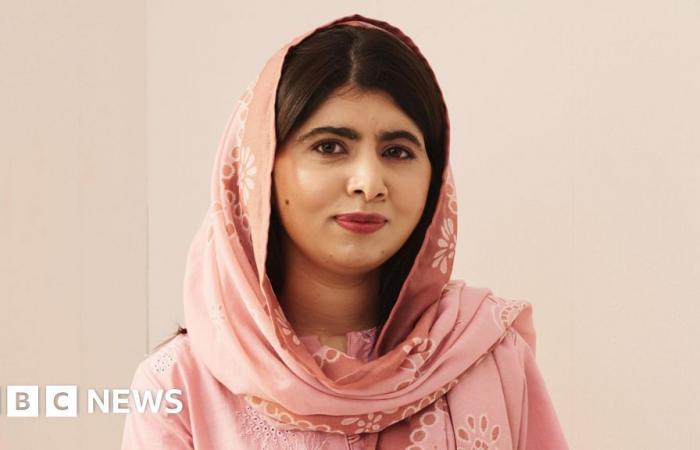 Getty Images
Getty ImagesA bullet failed to silence her, now Malala Yousafzai is lending her voice to the women of Afghanistan.
In just a few years since the Taliban retook control of the country, women’s rights have been eroded to the point where even singing is banned.
Malala has a personal history with the Taliban across the border in Pakistan, after a gunman from the hardline Islamist group shot her as she sat on a school bus.
The speed of change in Afghanistan, if not the brutality, has surprised Malala, who since that near-fatal shooting in 2012 has campaigned for equality.
“I never imagined that the rights of women would be compromised so easily,” Malala tells BBC Asian Network.
“A lot of girls are finding themselves in a very hopeless, depressing situation where they do not see any way out,” the 27-year-old Nobel Prize Winner says.
“The future looks very dark to them.”
In 2021, the Taliban regained power in Afghanistan, 20 years after a US-led invasion toppled their regime in the fallout of the 9/11 attacks in New York.
In the three-and-a-half years since Western forces left the country, “morality laws” have meant women in Afghanistan have lost dozens of rights.
A dress code means they must be fully covered and strict rules have banned them from travelling without a male chaperone or looking a man in the eye unless they’re related by blood or marriage.
“The restrictions are just so extreme that it does not even make sense to anybody,” says Malala.
The United Nations (UN) says the rules amount to “gender apartheid” – a system where people face economic and social discrimination based on their sex and something human rights group Amnesty International wants recognised as crime under international law.
But the rules have been defended by the Taliban, which claims they’re accepted in Afghan society and that the international community should respect “Islamic laws, traditions and the values of Muslim societies”.
 Apple TV+
Apple TV+“Women lost everything,” says Malala.
“They [the Taliban] know that to take away women’s rights you have to start with the foundation, and that is education.”
The UN says since the takeover more than a million girls are not in school in Afghanistan – about 80% – and in 2022 about 100,000 female students were banned from their university courses.
It’s also reported a correlation between the lack of access to education and a rise in child marriage and deaths during pregnancy and childbirth.
“Afghan women live in very dark times now,” Malala says.
“But they show resistance.”
The Pakistan-born activist, who became the youngest person ever to win a Nobel Peace Prizeis an executive producer on an upcoming film, Bread & Roses, that documents the lives of three Afghan women living under the Taliban regime.
The documentary follows Zahra, a dentist forced to give up her practice, activist Taranom, who flees to the border, and government employee Sharifa, who loses her job and her independence.
But the film isn’t just about the stories of three women, Malala says.
“It’s about the 20 million Afghan girls and women whose stories may not make it to our screens.”
Bread & Roses was directed by Afghan filmmaker Sahra Mani and US actress Jennifer Lawrence was also brought on board as a producer.
 Apple TV+
Apple TV+Sahra tells Asian Network her mission was “to tell the story of a nation under the Taliban dictatorship”.
“How slowly, all the rights have been taken away.”
Sahra managed to flee Afghanistan after the US-backed government collapsed following the withdrawal of troops in August 2021.
But she kept in touch with women back home, who would share videos which she then collected and archived.
“It was very important to find young, modern, educated women that have talent they were ready to dedicate to society,” says Sahra.
“They were ready to build the country but now they have to sit at home and almost do nothing.”
Even though the film hasn’t been released yet, Sahra believes the situation in Afghanistan has already deteriorated to the point where it would be impossible to make if she started now.
“At that time, women could still go out and demonstrate,” she says.
“Nowadays, women are not even allowed to sing… the situation is getting more difficult.”
The first-hand footage shows the women at protests – they kept the cameras rolling while being arrested by the Taliban.
And Sahra says the project only got harder over time as more of their rights were stripped away.
“We were really honoured that these women trusted us to share their stories,” she says.
“And it was really important for us to put their security in our priorities.
“But when they were out in the street asking for their rights, it was not for the documentary.
“It was for them, for their own life, for their own freedom.”
 Apple TV+
Apple TV+Malala says that, for women in Afghanistan, “defiance is extremely challenging”.
“Despite all of these challenges, they’re out on their streets and risking their lives to hope for a better world for themselves.”
All three of the women featured in the film are no longer living in Afghanistan and Sahra and Malala are hopeful the film will raise awareness of what women who remain endure.
“They are doing all that they can to fight for their rights, to raise their voices,” Malala says.
“They’re putting so much at risk. It’s our time to be their sisters and be their supporters.”
Malala also hopes the documentary prompts more international pressure on the Taliban to restore women’s rights.
“I was completely shocked when I saw the reality of the Taliban take over,” she says.
“We really have to question what sort of systems we have put in place to guarantee protection to women in Afghanistan, but also elsewhere.”
 Getty Images
Getty ImagesAnd as much as Bread & Roses deals with stories of loss and oppression, the film is also about resilience and hope.
“There’s so much for us to learn from the bravery and courage of these Afghan women,” says Malala.
“If they are not scared, if they are not losing that courage to stand up to the Taliban, we should learn from them and we should stand in solidarity with them.”
The title itself was inspired by an Afghan saying.
“Bread is a symbol of freedom, earning a salary and supporting the family,” Sahra says.
“We have a saying in my language that the one who gave you bread is the one who orders you.
“So if you find your bread, that means you are the boss of you.”
That’s exactly the future she hopes to see for the women of Afghanistan and, based on what she’s seen, one she believes they will achieve in the end.
“Women in Afghanistan, they keep changing the tactic,” she says.
“They keep searching for a new way to keep fighting back.”
Listen to an extended interview with Malala and Sahra on BBC Asian Network News Presents at 23:00 on 18 November or catch up on BBC Sounds.
Bread & Roses will be streamed globally on Apple TV+ from 22 November.
Additional reporting by Riyah Collins.

Listen to Ankur Desai’s show on BBC Asian Network live from 15:00-18:00 Monday to Thursday – or listen back here.









